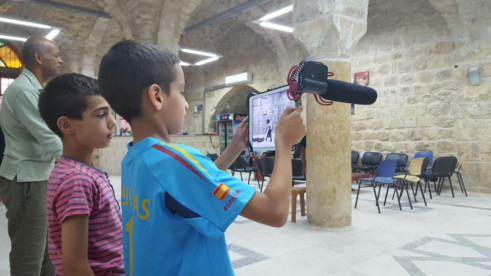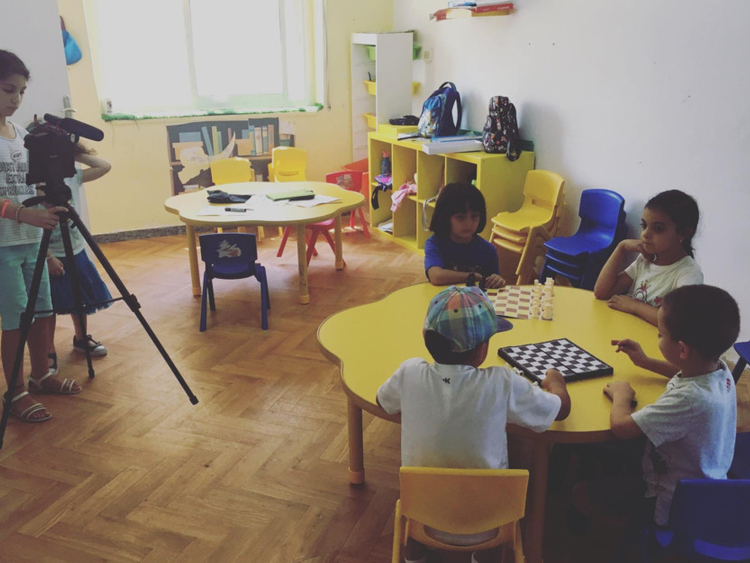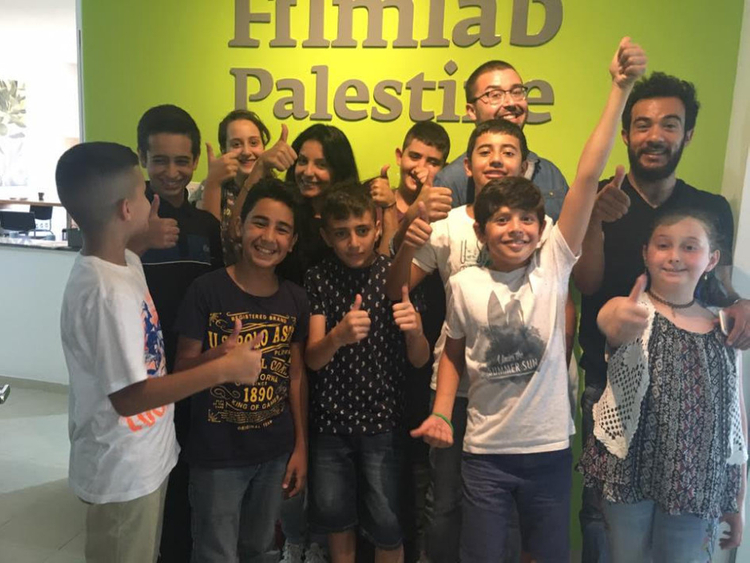
Palestinians have a story to tell and films are a perfect medium in which they can express narratives and preserve their collective memory, just as other oppressed peoples have successfully done before them. And in Palestine, films have assumed a political complexion and become a means of resistance, depicting their experiences under a brutal military occupation.
Tucked away in a residential neighbourhood of Ramallah, far from the hustle and bustle of the city, is Filmlab: Palestine. It is there I meet with a youthful and vibrant woman, Hadil Abuhmaid, who co-founded it in 2014 with the Palestinian director, Hanna Atallah, who is also its artistic director.
Hadil was busy preparing to leave Filmlab: Palestine to further her studies in media in America.
“We were working on a project in filmmaking in 2011 and we realised that it was not sustainable, because we had no formal entity to teach filmmaking. Our project was in a refugee camp in Jordan. The participants documented the Nakbah – the Palestinian expulsion – that the older generation experienced, and to keep the memory alive, they documented their narratives through the eyes of a younger generation.”
“Participants aged between 13 and 30, produced five documentaries of between three to five minutes. Four of them were then invited to screen their documentaries at a film festival in Northwestern University in Illinois. After the positive impact of the screenings, we learnt that this experience introduced our youth to filmmaking as a creative and unconventional method to tell their own personal narratives. Sometime after that, Filmlab: Palestine was established to further document the collective Palestinian memory as well as individual voices within the occupied West Bank, Gaza and abroad. And though many Palestinians pursue filmmaking to tell our story, we believe we needed something sustainable.”
Filmlab: Palestine seeks to expand and cultivate the existing cinematic culture while providing much-needed technical and artistic support for emerging filmmakers.
“The lack of a cinematic culture, poor audience responses, and a lack of demand for independent films is another challenge Palestinian filmmakers are faced with, Abuhmaid notes. “These are challenges for many indie filmmakers. With films that are produced by Hollywood, Bollywood, and other commercial companies occupying our screens, the average viewer has become used to consuming what is being provided, and is not searching for content outside his or her small screen.”
“We then came up with Days of Cinema, an annual event in October – this year it’s our fourth edition. It is designed to show audiences the wondrous world of cinema, the power of alternative, independent film production from seven different countries It comprises three parts: filmmakers and distributors from all over the world come to Palestine to screen their movies; then we have screenings for youth and kids; and we facilitate master classes with local and international filmmakers wherein discussion sessions with filmmakers from diverse backgrounds takes place.” Abuhmaid notes: “Last year, we instituted the Sunbird Award for short narratives and feature-length documentaries, and this year we added the Sunbird Production Award, in cooperation with Aarhus Film Workshop, and Mad Solutions. This award seeks to promote a cinema culture in Palestine, and encourage local filmmakers to create film art. Competition is open for young filmmakers but the film’s topic or story must be in Palestine or about Palestine. We screened films in Ramallah, Nablus, Jenin, Hebron, Jerusalem and even in Gaza City. The whole exercise is donor-funded through private Palestinian sector and international filmmaking support, as we are a non-profit entity.”
Abuhmaid, besides driven by this vision is nevertheless realistic. “Screenings of films generally brought in 10 to 15 people but we are working to change that. On the other hand, for the children, we screened films at several venues in collaboration with schools, and the spaces were always filled.”
Abuhmaid continues” “This year we are launching Palestine Film Meetings, which is an industry platform for local and internationals to discuss and network with a focus on low-budget filmmaking for our young filmmakers.”
“Locally, Filmlab: Palestine has created partnerships with eight youth centres, many of them in remote Palestinian villages, to set-up cinema clubs that will be launched during the Days of Cinema programme in October, with monthly screenings for youth between the ages of 16 to 29.”
“This space is available to Palestinian filmmakers,” Abuhmaid says. “We rent equipment, provide editing and production facilities – all for free. We also provide co-production support in Palestine and abroad as well as equipment support. To create a cinema culture amongst Palestinian youth, we host filmmaking workshops for kids aged between 10 to 14 and teach them to use their smartphones and iPads and follow up by educating them on editing with various applications. It’s our way of supporting Palestinian filmmaking and cinema.”
Overall, Filmlab provides a talent support programme, with workshops in filmmaking, storytelling, production, acting, directing and scriptwriting. Success stories abound with Rama Marie participating in their Berlin residency partnership and Mahasen Nasser-Eldin representing Palestine in Sheffield.
“Independent Palestinian filmmakers find it very difficult to fund their projects, partly because there is hardly any formal funding available, as cinema and culture-related projects rank low on the Palestinian Authority’s list of priorities, and as international filmmaking grants come with many restrictions – such as compliance with requests to hire an international crew in return for receiving the grant, acquire a certain percentage of the production cost from local or regional entities such as the Palestinian Ministry of Culture, Palestinian production companies, or Arab Funds,” Abuhmaid says. “Funds and financial support from these entities is rare and difficult to obtain.”
As for the future, Abuhmaid is prescriptive.
“Film literacy projects introduced in local schools can help turn the Palestinian younger generations from consumers into producers of media, and the individual and collective efforts of filmmakers and their supporting organisations should be combined under one independent umbrella that aims to foster a local cinema culture and develop a Palestinian film industry that is competitive both on regional and international levels,” she says.
Leaving Filmlab: Palestine I am informed that an idea to serve young filmmakers has matured into a space where the needs of filmmakers, both young and aspiring as well as established ones, has taken shape, and it is where they may be able to revitalize the culture of film in Palestine and hopefully liberate it from the grasp of Hollywood and Bollywood.
Rafique Gangat, author of Bending the Rules, is based in Occupied Jerusalem.














